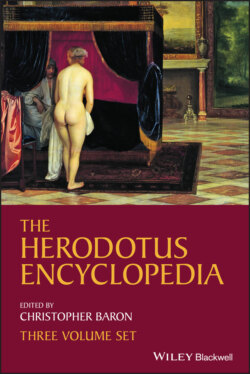Читать книгу The Herodotus Encyclopedia - Группа авторов - Страница 89
ADRASTUS ( Ἄδρηστος, ὁ) son of Gordias
ОглавлениеANTHONY ELLIS
University of Bern
Adrastus’ appearance in Herodotus’ Histories is brief and tragic. A member of the Phrygian royal house (son of GORDIAS and grandson of MIDAS), he arrives at SARDIS in disgrace (1.35), exiled from his native land for the unintentional MURDER of his brother, and is ritually purified by CROESUS and hosted at the Lydian court. After a DREAM foretells the death of Croesus’ son ATYS, Croesus appoints Adrastus as Atys’ protector during a trip to kill a monstrous boar (see PIGS). At the critical moment Adrastus misthrows his spear and accidentally kills his ward. Returning to Sardis in chains, Adrastus offers himself up to Croesus for execution; Croesus, in pity, opines that the ultimate responsibility for Atys’ DEATH lay with “one of the gods” (words redolent of Homer’s PRIAM, Il. 3.164) and lets him live. Nevertheless, the distraught Adrastus slaughters himself on Atys’ tomb, “recognizing that he was the most ill‐fated (βαρυσυμϕορώτατος) of all the people he knew” (1.45.3). The episode is written in Herodotus’ most emotive and paratactic style, and many similarities with TRAGEDY have been observed (see Chiasson 2003). Adrastus, strongly associated with the word συμϕορή (chance/DISASTER), seems to embody the truth of SOLON’s maxim that “man is entirely συμϕορή” (1.32.4). The details of the story are not related in other sources (though the death of Croesus’ healthy son is mentioned by XENOPHON, Cyr. 7.2.20).
Adrastus, like Atys, has a “speaking‐name”: in Greek ἄ‐δρασ‐τος can be understood as “inescapable” or “unable‐to‐escape,” and the epithet Ἀδράστεια was connected with Nemesis at least as early as Antimachus c. 400 BCE (F53 Wyss = Strabo 13.1.13/C588). That the association predates Antimachus is suggested by the fact that Herodotus’ Adrastus acts as the unwitting agent of “great nemesis from god” (1.34; so Munn 2006, 333–36), and the story may be connected to a foundation MYTH for the cult of Nemesis Adrasteia. The cult of the goddess Adrasteia was, in any case, established in ATHENS by 429/8. Remarkably, the name Ἄδραστος seems to have independent origins in Greek—the hero Ἄδρηστος of SICYON is known to HOMER (Il. 2.572) and Herodotus (5.67), and the name is amply attested in the LGPN with Mycenaean forebears—and in Lydian (perhaps explaining the several Trojan Adrastuses in the Iliad: 2.830, 6.37–65, 16.694). The name is not, however, commonly attested in PHRYGIA outside the LYDIA‐Phrygia border region (van Bremen 2010, 446–50).
SEE ALSO: Adrastus son of Talaus; Fate; Gods and the Divine; Pollution; Prophecy; Suicide
